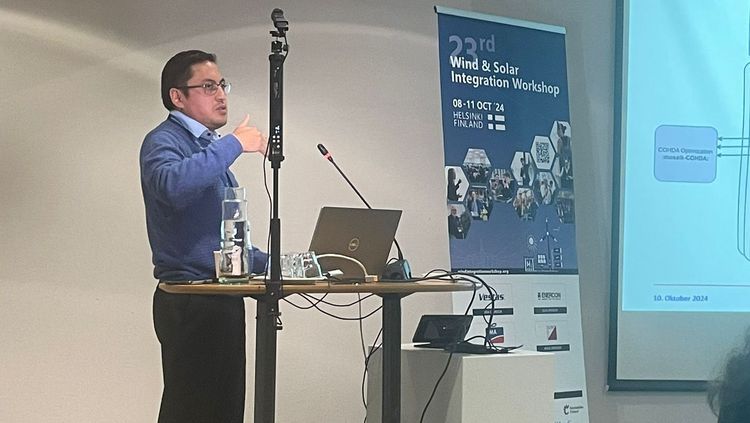Dr.-Ing. Fernando Peñaherrera (PPRE 2014-16) presents the results of his research from the Zukunftslabor Energie at the 3rd Wind & Solar Integration Workshop in Helsinki. The workshop included experts from government organizations, private sector, and research organizations.
On October 10th, Dr.-Ing. Peñaherrera presented the main results of the simulation of operational flexibilities in the context of his research on optimization of smart grids.
As our reliance on renewable energy sources and electric vehicles grows, managing power flow and maintaining operational boundaries becomes increasingly complex. This study has made contributions to addressing this challenge by evaluating the potential of energy storage systems by implementation of operational flexibilities in their operation.
In a case study set in northern Germany, this research created a virtual smart grid that integrated energy generation, use, and storage components. By using a co-simulation framework to balance energy across buildings, it was able to optimize operational plans and reduce power flow problems.
The results indicate that the inclusion of central control and flexibility optimization reduced voltage range violation incidents by 81%, and eliminate serious voltage issued completely. This not only displays the effectiveness of this approach but also highlights the potential for significant cost savings (at the operational and infrastructure level) and improved grid stability. This research also found that incorporating energy storage systems can reduce storage demand, as seen in a decrease in the mean state of charge of batteries from 42% to 30%. This means that energy storage systems can be optimized to work more efficiently, reducing power demands, and minimizing the need for new infrastructure.
As we move towards a more sustainable future, this research offers a promising solution for managing power flow and maintaining grid stability. By integrating other storage systems, such as thermal storage, into their control approach, it is paving the way for a comprehensive multi-domain flexibility control strategy that can benefit communities worldwide. The workshop covered topics focused on the integration of renewable energy into the modern energy system. Other key areas covered within the workshop were grid forming, expansion of the hydrogen production capabilities, optimization of energy systems, and management of prosumer networks. The workshop was sponsored by Energynautics GmbH.




